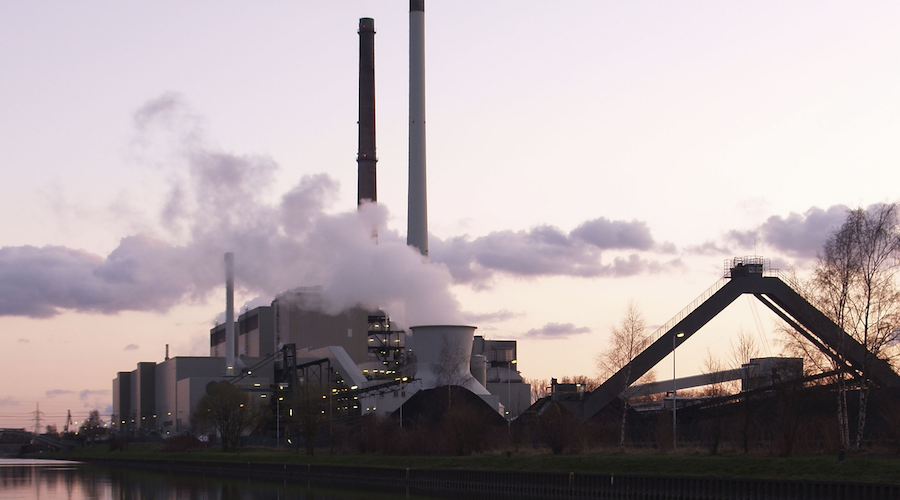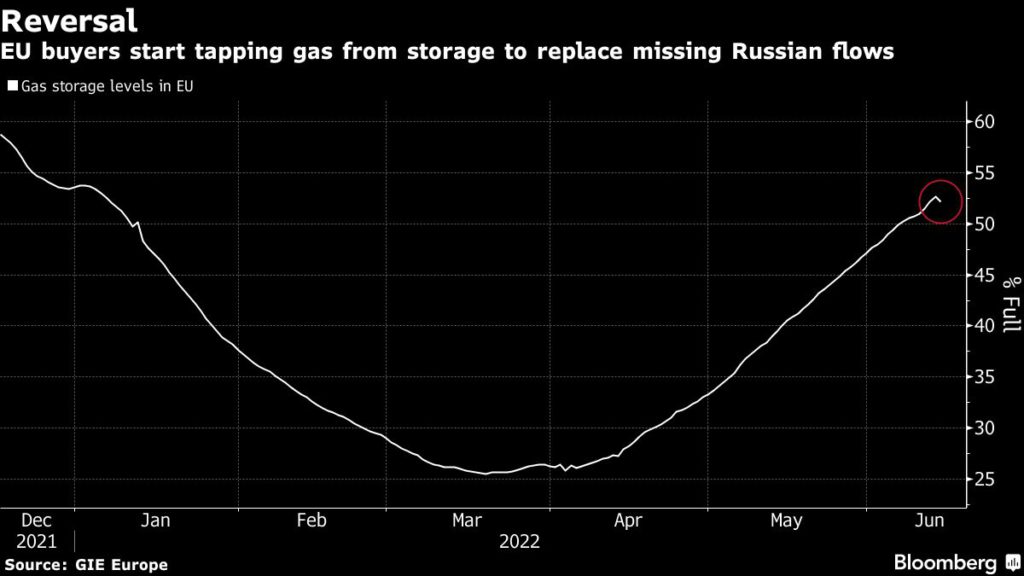Germany is taking steps to bolster gas supplies, Habeck says

The German government will step up efforts to bolster gas storage levels after Russia reduced flows in a move Economy Minister Robert Habeck said was intended to unsettle energy markets.
The government will make available additional credit lines by state-owned lender KfW to guarantee gas injections at storage sites. It also plans incentives for the industry to reduce consumption and is preparing to fire up more coal plants to keep the use of gas at a minimum. The package of additional measures was announced on Sunday as the government seeks to ensure there will be enough gas available during the winter.
“Security of supply is currently guaranteed. But the situation is serious,” Habeck said in an emailed statement. “Gas consumption must fall further, and in return, more gas must be put into the storage facilities, otherwise things will really get tight in the winter.”
Europe’s largest energy consumers, such as Germany and Italy, started receiving less Russian gas last week, raising concerns about a shortage of the fuel that feeds their industrial production and household heaters. Flows through the Nord Stream pipeline — Russia’s key corridor to Europe — were cut by 60%, with companies including Uniper SE saying they’re getting less gas than agreed with the Russian supplier.
The European Commission said Russia is using its energy supplies for “blackmail.” Russia’s move led prices to rise more than 50% in the week, fueling the already high inflation that plagues the continent. Since the beginning of the war in Ukraine, Germany has been preparing for a cut and has tapped all resources available to fill the possible supply gap. Germany depends on Russian gas for 35% of its needs, and Europe’s biggest gas consumer is scrambling to avoid a supply shock.
“It’s obviously Putin’s strategy to unsettle us, drive up prices and divide us,” said Habeck. “We won’t allow that.”
More gas, please
Germany will provide the gas-market manager Trading Hub with the liquidity it needs to purchase more gas to fill storage sites. That is necessary for Germany to achieve its target to get storage sites 80% full by Oct. 1 and 90% by Nov. 1.
Right after Russia cut flows through Nord Stream 1 last week, EU gas buyers started tapping gas from the storage sites to replace the missing flows.
Germany’s gas storage levels increased to a total of 56.7% on Saturday from 56.3% on Friday, the Federal Network Agency said on its website, but are still below the average for this time of the year.

The KfW’s loan will be secured by a guarantee from the government. Germany had already asked Trading Hub Europe to buy liquefied gas for storage in March. The company — formed by gas grid operators, such as Open Grid Europe and Gasunie — is financed by network charges paid by gas consumers in Germany.
The Greens party minister also said the country will rely more on coal-fired power plants to produce electricity. A bill providing the legal basis is making its way though parliament and should take effect quickly after discussions in the upper house on July 8.
Using more coal to generate power is “bitter, but it’s simply necessary in this situation to reduce gas consumption,” he said. “We must and we will do everything we can to store as much gas as possible in the summer and fall.”
Siegfried Russwurm, president of the German industry lobby group BDI, said the country should “stop gas-fired power generation now and get coal-fired power plants out of reserve immediately,” in an interview with Funke Mediengruppe published Saturday. Importing electricity from neighboring countries has its limits, he said.
Savings will also have to be made by the industry. An auction model will begin this summer to encourage industrial gas consumers to save fuel, which can then be put into storage, Habeck said, adding that the government is ready to take further measures if needed.
The country’s three-stage crisis plan is currently at the first level. At the highest stage, the state would take control over Germany’s gas distribution.
“Germany will already be confronted with a massive gas shortage this summer, which will increase over the next winter,” said Christoph Merkel, managing director of consultancy Merkel Energy. “The measures are fine. However, very little has been discussed about the emergency level, although it is much more likely to take effect soon.”
(By Vanessa Dezem and Rainer Buergin, with assistance from Arne Delfs and Andrew Davis)
{{ commodity.name }}
{{ post.title }}
{{ post.date }}




Comments